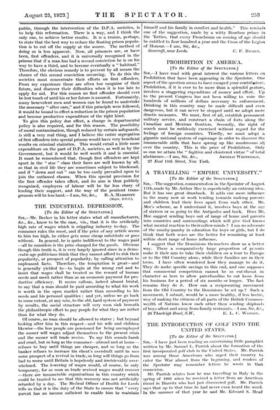THE INDUSTRIAL DEPRESSION.
[To the Editor of the SPECTATOR.]
Sin—Mr. Becker in his letter states what all manufacturers, &c., &e., know to be the case, viz., that it is the artificially high rate of wages which is crippling industry to-day. The consumer rules the roost, and if the price of any article seems to him too high, he either gets some cheap substitute or goes without. In general, he is quite indifferent to the wages paid —all he considers is the price charged for the goods. Obvious though this truth is, it is very largely ignored since in a demo- cratic age politicians think that they cannot afford to risk their popularity, or prospect of popularity, by calling attention to unpleasant facts. Therefore, the temptation is great—and is generally yielded to—to begin at the wrong end and to insist that wages shall be treated as the reward of human needs and merit rather than as an economic payment for pro- ductive efficiency. It seems callous, indeed almost brutal, to say that a man should be paid according to what his work is worth in the open market rather than according to his needs and his personal qualities ; and yet, unless we go back to some extent, at any rate, to the old, hard system of payment by results, the social structure will very soon sink beneath the philanthropic effort to pay people for what they are rather than for what they do.
Of course, no man should be allowed to starve ; but beyond looking after him in this respect—and his wife and children likewise—the less people are pensioned for being unemployed the sooner will wages adjust themselves to the present crisis and the sooner will trade revive. To say this sounds harsh and cruel, but so long as the consumer—abroad and at home— refuses to buy until things are cheaper, and so long as the banker refuses to increase his client's overdraft until he sees some prospect of a revival in trade, so long will things go from bad to worse until Britain is hopelessly and irretrievably over- whelmed. The lowering of wages would, of course, be only temporary, for as soon as trade revived wages would recover —there are innumerable organisations in this country which could be trusted to see that this recovery was not artificially retarded by a day. The Medical Officer of Health for Leeds tells us that it is the duty of the State to ensure that "every parent has an income sufficient to enable him to maintain himself and his family in comfort and health." This reminds one of the suggestion, made by a witty Bourbon prince in the 'forties, that every Frenchman on coming of age should be entitled to four hundred a year and the Cross of the Legion of Honour.—I am, Sir, &c.,


































 Previous page
Previous page